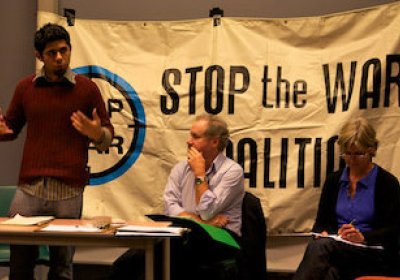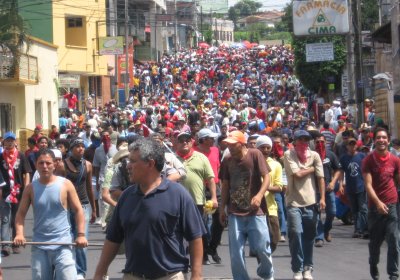In the United States, Google-owned video-sharing site YouTube has banned the video for hip hop star M.I.A.’s new single “Born Free”, citing the graphic nature of its content.
More than nine minutes long, the clip, directed by Romain Gavras, begins with heavily armed soldiers with US flags on their uniforms raiding someone’s home. The location is not known, but the setting is reminiscent of Baghdad or the Palestinian West Bank.
835
The protest song is present still, yet to what extent does its significance reach the alienated world? The medium that transcends form and style seems smothered beneath the illusion of freedom of expression.
The murder of Chilean revolutionary singer Victor Jara may be a nauseating historical crime yet, today, protest singers are still exiled or assassinated in some countries. In the face of such brutal epilogues, the protest song may be mellowing its voice into a more socially acceptable role.
Beyond Black & White
By Manning Marable
Verso Press, 2009, 319 pages
Review by Malik Miah
Manning Marable’s latest book is an update of a valuable critique of Black and US politics first issued in 1995. He revised it last year, adding new chapters covering the period from 1995 to 2008, including an analysis of the meaning of the election of the first African American president of the US, Barack Obama, in November 2008.
Clients at the Fairfield Migrant Resource Centre heard on April 29 that people in disadvantaged areas, such as Fairfield, could have their welfare benefits "quarantined" as early as next year.
The public meeting at the centre featured Peter Davidson from the Australian Council of Social Services and Richard Downs, spokesperson for the Alyawarr people’s walk-off in the Northern Territory.
The walk-off began in July 2009, protesting against the effects of welfare quarantining, and other NT intervention measures, in the community of Ampilatwatja.
Visiting Pakistani socialist and anti-war activist Ammar Ali Jan and Edmund Rice Centre director Phil Glendenning delivered powerful presentations on why the Afghanistan-Pakistan “war on terror” was a fraud. They spoke at a meeting organised by Stop the War Coalition on April 27.
Ali Jan said the US was facing a checkmate in Afghanistan after failing to find a credible replacement for the corrupt and increasingly weak President Hamid Karzai (also known as “the mayor of Kabul” for his limited political influence).
Israeli queer activists organised a protest on April 29 in front of the Israeli foreign affairs ministry in Jerusalem to protest against an “Israeli LGBT Festival” being organised in San Francisco called “Out in Israel”. The US event is funded by the Israeli consulate and Jewish organisations' together with support from the Israeli foreign affairs ministry.
About 90,000 people marched in Yomitan, Okinawa on April 25 to call for the closure of US Marine Corps Air Station Futenma, an April 29 Counterfire.org article said. Protesters included the governor and all the mayors of Okinawa.
Participants issued a statement calling for immediate closing and relocation of Futenma US Base outside Okinawa or the country.
The rally recorded a record-high participation in Okinawa, expressing public opinion against the base. In 1995, 85,000 marched in protest at the rape of a schoolgirl by US servicemen.
A military coup, backed by the United States, ousted a democratically elected government in Honduras on June 28, 2009. It has arrested, without trial, thousands of democracy activists.
More than 50 activists from the National Popular Resistance Front (FNRP) have been killed, and there are more than 100 other violent deaths related to the coup and curfews.
The lesbian, gay, bi-sexual, trangender and intersex (LGBTI) community is being particularly targeted.
Repression and resistance. These two words sum up Honduras today.
There is truly terrible repression — reminiscent of the Central American “dirty wars” run by US-trained militaries in the 1980s.
But there is also unprecedented resistance that has mobilised a previously compliant majority.
This is the situation that exists in the aftermath of the June 28 military coup last year that overthrew the elected president, Manuel Zelaya. Zelaya’s crime was to agree to the demands of a united front of social movements to start a democratic process of writing a new constitution
As towns go, Orroroo in South Australia might seem small, but with 850 people it is one of the larger stops on the road between Broken Hill and Port Augusta. The countryside around it is marginal farmland.
Only in the occasional year is there enough rain for a good crop of wheat, and in a process with well-researched links to global warming, the wet years have been getting fewer.
It is ironic, therefore, that this district 250 kilometres north of Adelaide now seems destined to hurry climate change along.
In a democratic society, when there is a deep crisis, it is customary for the government to dissolve parliament and call elections in order for the people to decide. This happened in Britain and France after mass strikes and demonstrations in the 1960s and 1970s.
After mass right-wing “Yellow Shirt” protests against the government in Bangkok in 2006, Thaksin Shinawatra’s Thai Rak Thai (TRT) government dissolved parliament and called elections.
On May 1, international workers’ day, 500 people marched in Wollongong.
Trish Corcoran from the Socialist Alliance spoke about the racist Northern Territory intervention on Aboriginal communities, and the solidarity the union movement is showing with the people fighting it.
Chris Cumming, from the Construction Forestry Mining Energy Union, reported on the nasty dispute between the Tahmoor mineworkers and their employer, coal multinational Xstrata. Nearly $450 was raised at the rally for the miners.
- Page 1
- Next page




